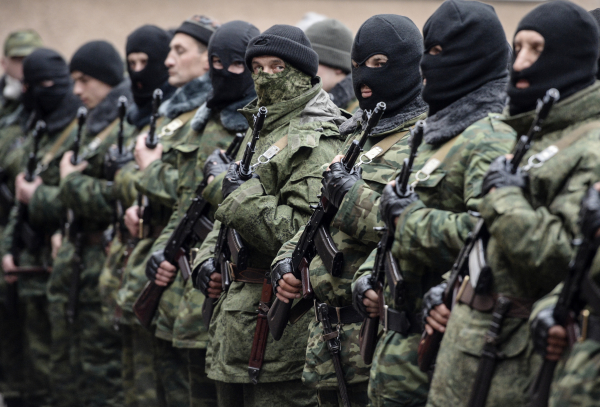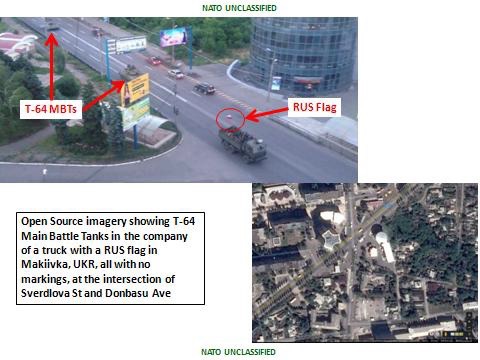
Last week, the Trump administration agreed to send lethal defensive weapons to Ukraine. The order, packaged by the State Department as an affirmation of Ukraine’s right to defend itself against Russian-backed aggression, was greeted on Capitol Hill as a logical step in confronting what many lawmakers view as Vladimir Putin’s expansionist foreign policy.
Proponents of this recommendation argue that the bloodier Russia’s nose becomes and the higher the death toll for Russian soldiers on the battlefield, the more pressure Putin will be under to cut ties with the outgunned and outmanned separatists. The prevailing logic, however, is based on a hopeful theory of how they hope Putin will respond. Moscow’s conduct over the three-and-a-half years of combat in Eastern Ukraine, however, should lead to the exact opposite conclusion — when push comes to shove, the Russians have proven to be willing to withstand the financial, political, and military pain associated with preventing the total military defeat of anti-Kiev forces.
Russian officials have, predictably, denounced President Trump’s authorization of lethal equipment to the Ukrainians — including the likely delivery of Javelin anti-tank weapons, which could pulverize Russian armor— as an aggressive act meant to deliberately sabotage the Minsk peace process. While there is a possibility that Ukrainian forces could use U.S.-supplied heavy weapons in an offensive capacity as the Russians suggest, it is more likely that this assistance will be used by Moscow as an excuse to redouble its own support to Ukrainian proxies in Donetsk and Luhansk.
 The Russians have demonstrated in word and in deed since they worked with proxies and invaded in April 2014 that the Ukrainian government will not be permitted to win the conflict militarily and reincorporate the Donbas into the Ukrainian state.
The Russians have demonstrated in word and in deed since they worked with proxies and invaded in April 2014 that the Ukrainian government will not be permitted to win the conflict militarily and reincorporate the Donbas into the Ukrainian state.
In the fall of 2014 and the winter of 2015, when Ukrainian troops and pro-government armed battalions were engaging Moscow’s proxies in ferocious door-to-door, house-to-house fighting, Russia escalated and forcefully stepped in, supplying personnel, tanks, supplies, and reinforcements to beat back Kiev’s advances. In Putin’s mind, allowing Ukraine to retake strategic territory was an unthinkable prospect that would lead Kiev to believe that it could squash the rebellion militarily. The infusion of Russian troops stopped Ukrainian territorial advances in their tracks, at considerable human cost to Kiev.
In other words, whenever pro-Russian militants were losing ground or at risk, Moscow turned on the spigot of assistance to prevent a humiliating defeat or retreat. This is one of the biggest reminders to the world community that Ukraine’s political disposition is ultimately far more important to Russia’s strategic interests than it is to Washington’s. No amount of U.S. military equipment or heavy weapons systems is likely to eclipse what the Russians will provide to the other side.
To believe Russia will be intimidated into withdrawing its troops from Ukrainian territory or suing for a peace with a government Moscow sees as a puppet of the West just because a few more of its soldiers have been killed is to place hope over the reality of Putin’s track record throughout the war.
Whether we in the United States or Western Europe accept it as legitimate or not, Putin is highly motivated to preserve Russian influence and freedom of movement in a country that shares a 1,426-mile border with the Russian Federation. To allow Ukraine to drift fully into Europe’s orbit on his watch would be nothing short of a personal political humiliation for Putin and, more important, a geopolitical catastrophe for a Russia whose political elites remain incredibly nervous about a shrinking Near Abroad and any hint of political revolution in the former Soviet space.
President Trump’s decision to increase U.S. military engagement in Ukraine’s conflict comes at a curious time, just three months after Putin broached the prospect of an international peacekeeping mission for the very first time and two days after Moscow, Kiev, and the separatists reaffirmed their intention to call a holiday ceasefire and proceed toward an “all-for-all” prisoner exchange. While dozens of ceasefires have come and gone in Ukraine and a Russian-drafted peacekeeping proposal was far below the threshold of what would be required to actually implement an impartial peace in the Donbas, Putin’s willingness to at least consider it left a slim opening for European diplomats and U.S. Special Representative Kurt Volker to explore options with their Russian counterparts.
Washington’s move to provide U.S. lethal weapons stockpiles to the Ukrainians could have an adverse impact on all of these diplomatic processes. By throwing the United States deeper into the Ukrainian morass, President Trump has taken the first giant step toward further American involvement in the likely event that Moscow escalates and the Ukrainian government asks for more weapons. This is a frightening possibility, particularly for Americans who would prefer not to intervene on behalf of a nation that is not even a member of NATO and whose political direction is irrelevant to America’s policy in Europe.
The unanswered questions are nearly endless, and there is no sign the White House has even begun thinking about them. What, for instance, is the U.S. objective in Ukraine other than simply trying to bleed the Russians in a proxy conflict? When — not if — Russia escalates, what would the Trump administration do to counter it? How far is the U.S. willing to go to frustrate Moscow’s ambitions in a country it sees as an extension of its former Soviet glory? What if Putin, in his desire to respond to what he regards as American aggression in his own backyard, seeks to expand the conflict by stirring up pro-Moscow sentiment among the Russian-speaking populations of the Baltics? What would NATO do in that situation? Is NATO even prepared for such a contingency? And if they are not, how is any other Eastern European nation supposed to have any confidence in NATO when the transatlantic alliance can’t even defend its own members?
When you get down to the core of the matter, the turbulent waters of Ukrainian politics have the potential to send the American ship of state straight towards the dangerous rocks of a geopolitical crisis of its own making. The smartest move for Washington is to stay in the harbor and cede the waters to captains who have more at stake.
Daniel DePetris is a fellow at Defense Priorities, a Washington thinktank.
Sullivan says Ukraine supplemental should cover all of 2024, long-range ATACMS now in Ukraine
“We now have a significant number of ATACMS coming off their production line and entering US stocks,” Jake Sullivan said today. “And as a result, we can move forward with providing the ATACMS while also sustaining the readiness of the US armed forces.”


























